#pop psychology
Text
A lot of pop psychology gets thrown around and since I already have a headache, here's preventing you lot from making it worse.
Love-bombing: A manipulation tactic of increasing affection and grand gestures before or after doing something abusive, specifically to weasel one's way out of consequences.
What it is not: A streak of affection and generosity towards friends/loved ones.
Trauma-bonding: Knowingly traumatizing someone to take advantage of their vulnerable state, to then act like the "hero" or the one who cheers them up.
What it is not: Bonding over similar traumas.
Gaslighting: *Knowingly* convincing someone they cannot trust their own perception of a situation in pursuit of one's own narrative.
What it is not: Misaligned perception of events.
Narcissist: Someone afflicted with Narcissistic Personality Disorder, a traumagenic cluster B disorder, that struggles with self-obsession, paranoia, craving validity from the public, delusions of grandeur, and social disconnection.
It is not: Your rubbish ex that cheated on you.
Thank you for coming to my TED Talk.
-Xanthe
75K notes
·
View notes
Text
As I keep shouting into the void, pathologizers love shifting discussion about material conditions into discussion about emotional states.
I rant approximately once a week about how the brain maturity myth transmuted “Young adults are too poor to move out of their parents’ homes or have children of their own” into “Young adults are too emotionally and neurologically immature to move out of their parents’ homes or have children of their own.”
I’ve also talked about the misuse of “enabling” and “trauma” and “dopamine” .
And this is a pattern – people coin terms and concepts to describe material problems, and pathologization culture shifts them to be about problems in the brain or psyche of the person experiencing them. Now we’re talking about neurochemicals, frontal lobes, and self-esteem instead of talking about wages, wealth distribution, and civil rights. Now we can say that poor, oppressed, and exploited people are suffering from a neurological/emotional defect that makes them not know what’s best for themselves, so they don’t need or deserve rights or money.
Here are some terms that have been so horribly misused by mental health culture that we’ve almost entirely forgotten that they were originally materialist critiques.
Codependency
What it originally referred to: A non-addicted person being overly “helpful” to an addicted partner or relative, often out of financial desperation. For example: Making sure your alcoholic husband gets to work in the morning (even though he’s an adult who should be responsible for himself) because if he loses his job, you’ll lose your home. https://www.nytimes.com/2022/07/08/opinion/codependency-addiction-recovery.html
What it’s been distorted into: Being “clingy,” being “too emotionally needy,” wanting things like affection and quality time from a partner. A way of pathologizing people, especially young women, for wanting things like love and commitment in a romantic relationship.
Compulsory Heterosexuality
What it originally referred to: In the 1980 in essay "Compulsory Heterosexuality and Lesbian Existence," https://www.journals.uchicago.edu/doi/abs/10.1086/493756 Adrienne Rich described compulsory heterosexuality as a set of social conditions that coerce women into heterosexual relationships and prioritize those relationships over relationships between women (both romantic and platonic). She also defines “lesbian” much more broadly than current discourse does, encompassing a wide variety of romantic and platonic relationships between women. While she does suggest that women who identify as heterosexual might be doing so out of unquestioned social norms, this is not the primary point she’s making.
What it’s been distorted into: The patronizing, biphobic idea that lesbians somehow falsely believe themselves to be attracted to men. Part of the overall “Women don’t really know what they want or what’s good for them” theme of contemporary discourse.
Emotional Labor
What it originally referred to: The implicit or explicit requirement that workers (especially women workers, especially workers in female-dominated “pink collar” jobs, especially tipped workers) perform emotional intimacy with customers, coworkers, and bosses above and beyond the actual job being done. Having to smile, be “friendly,” flirt, give the impression of genuine caring, politely accept harassment, etc.
https://weld.la.psu.edu/what-is-emotional-labor/
What it’s been distorted into: Everything under the sun. Everything from housework (which we already had a term for), to tolerating the existence of disabled people, to just caring about friends the way friends do. The original intent of the concept was “It’s unreasonable to expect your waitress to care about your problems, because she’s not really your friend,” not “It’s unreasonable to expect your actual friends to care about your problems unless you pay them, because that’s emotional labor,” and certainly not “Disabled people shouldn’t be allowed to be visibly disabled in public, because witnessing a disabled person is emotional labor.” Anything that causes a person emotional distress, even if that emotional distress is rooted in the distress-haver’s bigotry (Many nominally progressive people who would rightfully reject the bigoted logic of “Seeing gay or interracial couples upsets me, which is emotional labor, so they shouldn’t be allowed to exist in public” fully accept the bigoted logic of “Seeing disabled or poor people upsets me, which is emotional labor, so they shouldn’t be allowed to exist in public”).
Battered Wife Syndrome
What it originally referred to: The all-encompassing trauma and fear of escalating violence experienced by people suffering ongoing domestic abuse, sometimes resulting in the abuse victim using necessary violence in self-defense. Because domestic abuse often escalates, often to murder, this fear is entirely rational and justified. This is the reasonable, justified belief that someone who beats you, stalks you, and threatens to kill you may actually kill you.
What it’s been distorted into: Like so many of these other items, the idea that women (in this case, women who are victims of domestic violence) don’t know what’s best for themselves. I debated including this one, because “syndrome” was a wrongful framing from the beginning – a justified and rational fear of escalating violence in a situation in which escalating violence is occurring is not a “syndrome.” But the original meaning at least partially acknowledged the material conditions of escalating violence.
I’m not saying the original meanings of these terms are ones I necessarily agree with – as a cognitive liberty absolutist, I’m unsurprisingly not that enamored of either second-wave feminism or 1970s addiction discourse. And as much as I dislike what “emotional labor” has become, I accept that “Women are unfairly expected to care about other people’s feelings more than men are” is a true statement.
What I am saying is that all of these terms originally, at least partly, took material conditions into account in their usage. Subsequent usage has entirely stripped the materialist critique and fully replaced it with emotional pathologization, specifically of women. Acknowledgement that women have their choices constrained by poverty, violence, and oppression has been replaced with the idea that women don’t know what’s best for themselves and need to be coercively “helped” for their own good. Acknowledgement that working-class women experience a gender-and-class-specific form of economic exploitation has been rebranded as yet another variation of “Disabled people are burdensome for wanting to exist.”
Over and over, materialist critiques are reframed as emotional or cognitive defects of marginalized people. The next time you hear a superficially sympathetic (but actually pathologizing) argument for “Marginalized people make bad choices because…” consider stopping and asking: “Wait, who are we to assume that this person’s choices are ‘bad’? And if they are, is there something about their material conditions that constrains their options or makes the ‘bad’ choice the best available option?”
#mad pride#neurodiversity#ableism#ageism#youth rights#liberation#disability rights#classism#capitalism#mental health culture#pop psychology#feminism#emotional labor
6K notes
·
View notes
Text
Okay, so you know how search engine results on most popular topics have become useless because the top results are cluttered with page after page of machine-generated gibberish designed to trick people into clicking in so it can harvest their ad views?
And you know how the data sets that are used to train these gibberish-generating AIs are themselves typically machine-generated, via web scrapers using keyword recognition to sort text lifted from wiki articles and blog posts into topical subsets?
Well, today I discovered – quite by accident – that the training-data-gathering robots apparently cannot tell the difference between wiki articles about pop-psych personality typologies (e.g., Myers-Briggs type indicators, etc.) and wiki articles about Homestuck classpects.
The upshot is that when a bot that's been trained on the resulting data sets is instructed to write fake mental health resource articles, sometimes it will start telling you about Homestuck.
#media#comics#webcomics#homestuck#classpects#ai#machine learning#psychology#pop psychology#mental health#let me tell you about homestuck
16K notes
·
View notes
Text

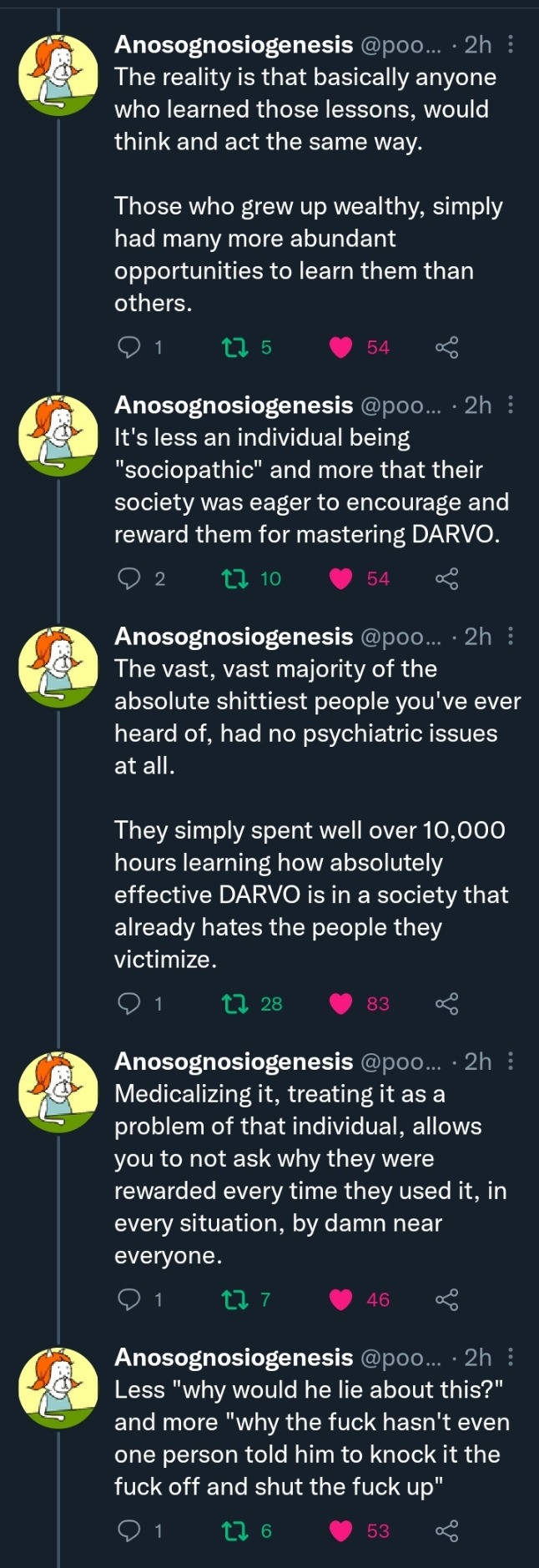
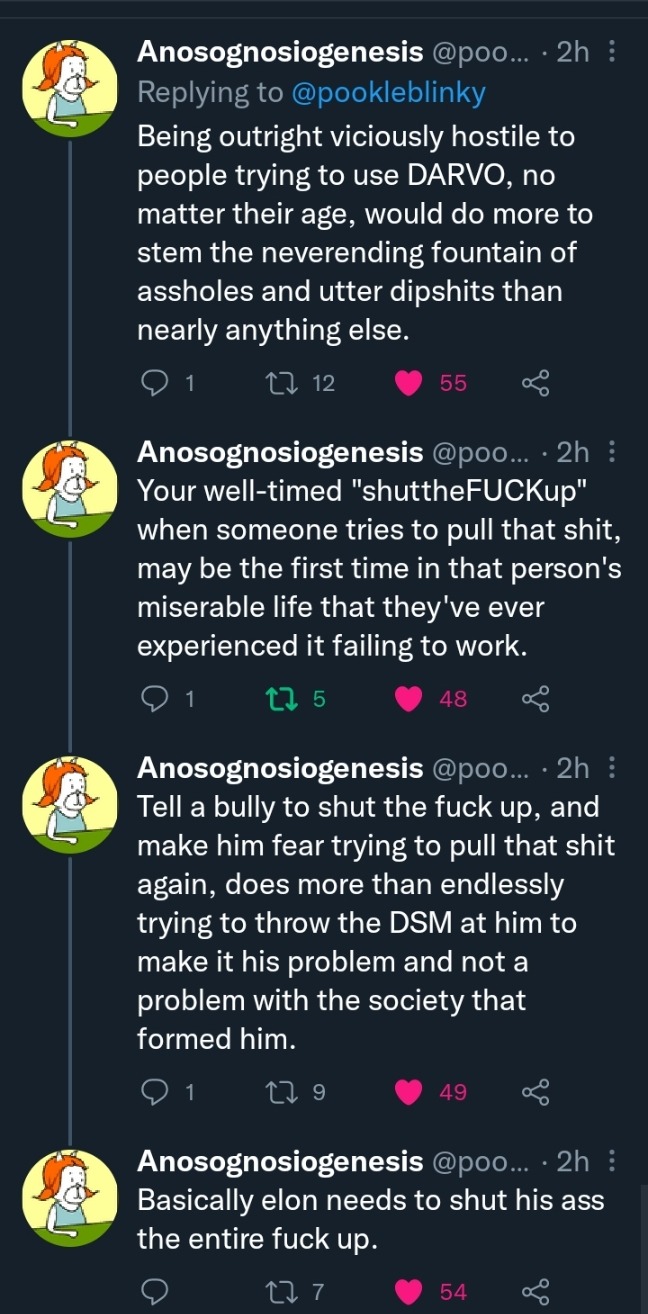
DARVO: Deny, Attack, Reverse Victim and Offender.
An abuser denies the abuse ever took place, attacks the person that was abused (often the victim) for attempting to hold the abuser accountable for their actions, and claims that they are actually the victim in the situation, thus reversing what may be a reality of victim and offender. It often involves not just "playing the victim" but also victim blaming.
TL;Dr: Stop pathologizing neurodivergent people and individualizing abuse, and start treating abusers and bullies as a social failing that are products of privilege.
Unless you want to insist that every bitchass who's ever plagued marginalized people has NPD.
#ableism#npd#bpd#aspd#cluster b#abuse#abuse dynamics#bullying#anti bullying#interpersonal relationships#systemic issues#social justice#capitalism#pop psychology#white people#capitalist individualism is a disease#twitter#elongated muskrat#knee of huss
3K notes
·
View notes
Text
Had a tik tok in my Facebook memories that said something about how with anti-maskers it ultimately comes down to them perceiving doing things for others as weakness since they grew up in a hyper-individulistic society. It's them exerting autonomy and refusing to stop under peer pressure, largely just for the sake of fighting something since that's a strength. A value. "I don't let others tell me what to do because I can't be controlled"
Made me think that everyone else bought into the same type of individualistic rhetoric through pop psychology: having "good" boundaries means never needing others and always putting yourself before everyone else regardless of circumstance and especially if they make you feel any feeling you don't want to feel. ...Like guilty for not caring enough to keep wearing a mask in 2023. That's a strength. A value. "I don't let others tell me what to do because I love myself"
The conclusion here being: being needed/needing others is a threat to your autonomy which is a Value to protect.

And when you really think about it applies to more than masking; supporting BIPOC, watching the news, showing up to protests, etc.
"I'm already depressed, I can't handle it. I'm watching out for my own mental health by not participating"
"it's all woke which makes me feel like a bad person cuz Im a bigot so I only watch what validates my bias"
And personally I get a little suspicious when two sides defined by their opposite social values come to the same social conclusion.

You should too. This rhetoric is holding us back. Individualism is holding us back. People need people. It's not toxic or abusive or manipulative to admit that, no matter how much society has tried to make you believe otherwise.
Oppressed people needing allies and your friends who need help moving aren't violating your boundaries or "bad for your mental health" just because You don't want to show up AND not feel bad about it.
Can the generation that grew up screaming "I don't know how to teach you that you should care about other people" at boomers please stand up and take a heaping tablespoon of your own medicine.
And then show gen z how to swallow it because growing up in the social climate we millennials curated online hasn't exactly inspired feelings of confidence in others or the future.
Both of which we still care about right? We still care about other people and the future? Not just ourselves?
Just want to confirm that we haven't gone Full Boomer as a collective yet cuz at this rate I wouldn't be surprised if someone responded saying that being expected to care about their friends is akin communist dictatorship
And could this be a Red Scare Psyop meant to discourage you from finding community, collectivism, and mutual aid in a time where your hyper-individulistic behavior and beliefs are being exploited for record breaking profits in the name of capitalism?

#remembering that thing I shared awhile ago where OP was talking about their friends calling it Traumadumping when OP talked-#about having a shitty few days. like??????#sometimes friends are unhappy or even depressed and they shouldnt have to hide that from friends sry not sry#most times they way you feel when they're talking are just NORMAL feelings of empathy and sympathy and sad and mad for them#Yeah the ppl around you will have an affect on you-the answer for dealing with this is building your emotional IQ NOT isolation#they need you as much as you need them actually#liberals#self care#society#lgbt#mutual aid#capitalism#biden#covid#masking#healthcare#social justice#socializing#boundries#pop psychology#sometimes you will be uncomfortable and that's OKAY#THATS GOOD
170 notes
·
View notes
Text
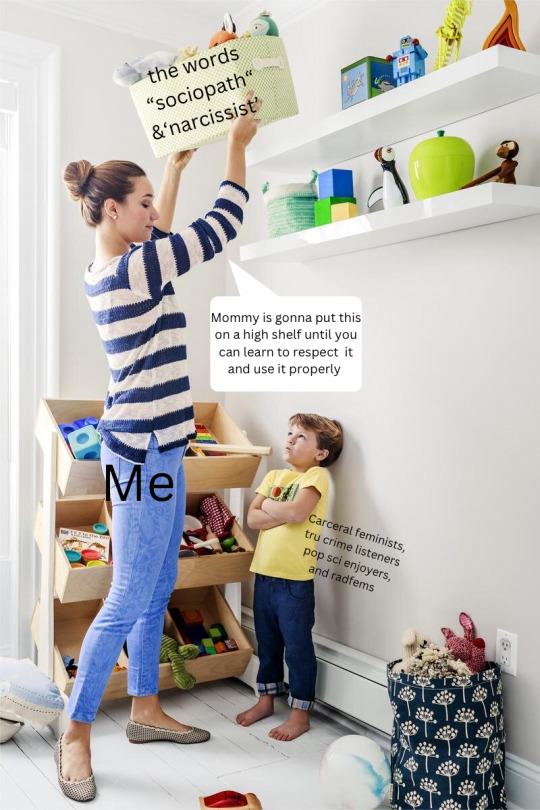
#uncaptioned#memes#cluster b#narcissism#NPD#aspd#anti terf#carceral feminism#prison abolition#pop sci#pop psychology#true crime#rose baker
724 notes
·
View notes
Text
pop psychology is so obsessed with the idea of the average person suddenly and inexplicably behaving irrationally or out of character. I get why that is compelling, but it’s rarely ever the full story and whats painted as irrational and inexplicable usually tends to be pretty explainable when you know the actual context lol.
112 notes
·
View notes
Text
me: wow, tiktok, a platform that has millions of creators and has prided itself on its #EduTok educational video campaign. i wonder what i can find about psychology on here!
video 1: i did one unit of psychology in college, 8 years ago, so let me give you an expert’s opinion on this therapeutic technique. follow for more!
video 2: this is why having a personality disorder makes someone a terrible irredeemable person :) (PS armchair diagnosing is VALID)
video 3: omgg guys, TIL that liking vanilla milkshakes?!…. means you have adhd, autism, bpd, depression, anxiety & maladaptive daydreaming?? woww!!
video 4: adhd is for himbo boys, autism is for quiet girls <3
video 5: how to spot (and exorcise) evil psychotic people with schizophrenia and those other psychotic spectrum disorders idk the name of
video 6: [hypnotic spiral in background] your mom is a narcissist your mom is a narcissist your mom is a narcissist your m
video 7: hi everyone, today i’m dividing all the mental illnesses into the categories of "uwu quirky child" disorder, "evil scary abusive" disorder, and "idk what that is" disorder. these categories should be added to the DSM btw
video 8: i’m an actual psychologist and i just openly hate people with cluster b PDs
video 9: i’m an actual psychologist and im fucking begging you, leave this place while you can, yes i’m talking to you aardvaark, RUN RUN RUN RUN RUN RUN RUN RUN RUN R-
video 10: i made a new youtube tutorial on how to purposely develop this complex, chronic, debhilitating disorder :3 check out my acc!!
#pop psychology#mental health#misinformation#tiktok psychology#anti intellectualism#wren speaks#(to be clear i’m exaggerating but these are all based on very real videos and trends ive seen)#and yes videos like the 10th example do very much exist. i can’t imagine that they work lol but they do exist#tw ableism#tw sanism
44 notes
·
View notes
Photo
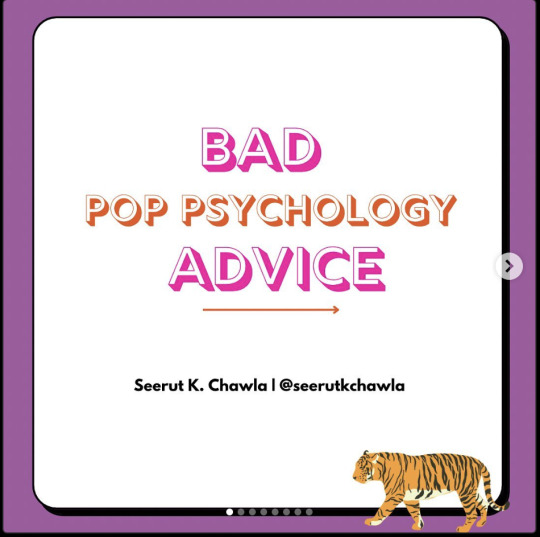







I’m as interested in learning about psychology and mental health as the next dysfunctional, unhappy person but too often I see dodgy advice and overly simplistic maxims repeated on social media.
Seerut K Chawla on Instagram is a breath of fresh air since she takes a no nonsense approach with critical thinking and healthy skepticism towards the infantilising trends in “Instagram DIY therapy”. Here’s an example of her content.
A trained psychotherapist, Dr. Chawla looks at the individual and society instead of just pandering to the self absorbed seeker. She can be kinda crude at times in her language, but she makes thought provoking points and makes the reader examine themselves and others.
You can check her out here https://www.instagram.com/seerutkchawla/.
#seerut k chawla#psychotherapy#mental health#pop psychology#psychology#quotes#growth mindset#individualism#tiger#bad advice#food for thought#purple#graphic design#instagram#instagram culture#wellness#critical thinking#skepticism#wisdom
86 notes
·
View notes
Text
This whole trend of blaming all sorts of problems on some kind of alleged "blockage" bugs the hell out of me. Like these people definitely aren't accounting for the possibility of executive dysfunction or other neurological wiring things that have nothing to do with some kind of mental "block."
23 notes
·
View notes
Text
Still half-amused at that "dark empath" post I rbed because of how much pop psychology has rotted our brains. People will look at videos like this (for example)
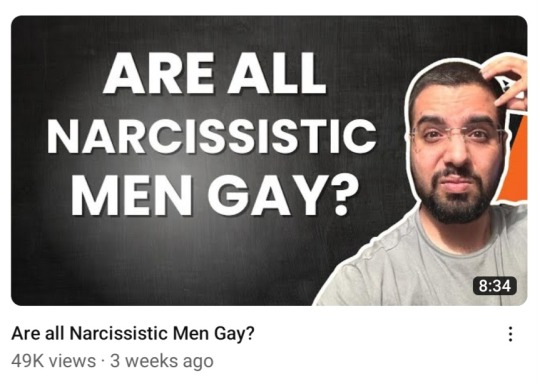

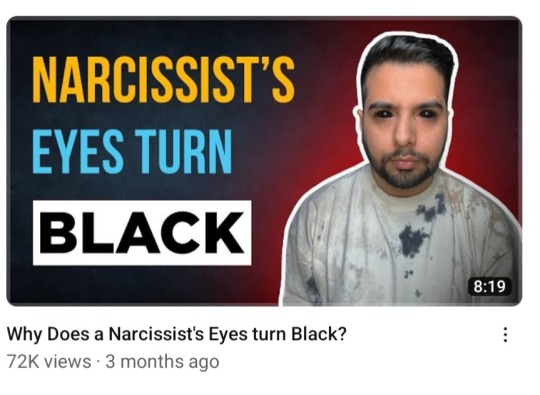
and will unironically take it seriously. Narcissistic people have a genuine disorder caused by several very real factors that unfortunately affects the people around them, not demons inside them. That's the kind of thinking that gets people killed by attempted exorcisms.
There are videos on Youtube that are like, "You wanna know what a narcissist's worse nightmare is? A dark empath!" Like a dark empath is a Pokémon type whose moves are super-effective against narcissists.
#pop psychology#npd#not getting into my own experiences with people with npd but it's a fucking disorder#you can tell it's a disorder#and there are treatments#people used to torture their kids because they thought they were changelings that's the kind of direction the demon shit is heading
13 notes
·
View notes
Text
Okay so is there any pseudo-psychology that doesn’t assume that everything wrong with you is due to repressed memories of childhood abuse? They all seem to do it! Satanic panic, Freud, gay conversion therapy, cult leaders… the gang’s all there. It’s been so resounding disproven but yet the idea that you can have secret repressed memories persists so strongly.
I assume it succeeds because it’s easy to tell someone in pain that the answer is simple. I can understand why people who are told that believe it. But what I don’t understand is how someone in a position of authority could tell another human being such a horrifyingly destructive lie.
The sheer amount of human misery this has caused breaks my fucking heart
14 notes
·
View notes
Text
My problem with the rise of pop psychology is that people actually think they know wtf they’re talking about when in reality they have no fucking idea. They throw around the word “boundaries” but fail to differentiate between what’s a boundary and what is considered controlling another person’s actions because YOU’RE uncomfortable. To all the Jonah Hill’s of the world, telling a woman to not post body pics on HER social media because it makes YOU uncomfortable and calling it a “boundary” is literally the definition of manipulation and renders you as the problem not the victim.
#these ‘woke’ men think they’ve become more emotionally aware but in reality they’re getting more tools to be manipulative asses 🫠#and to everyone that agrees with him please unfollow me#psychology#pop psychology#jonah hill#cancel Jonah hill#feminism#mine#thoughts
30 notes
·
View notes
Text
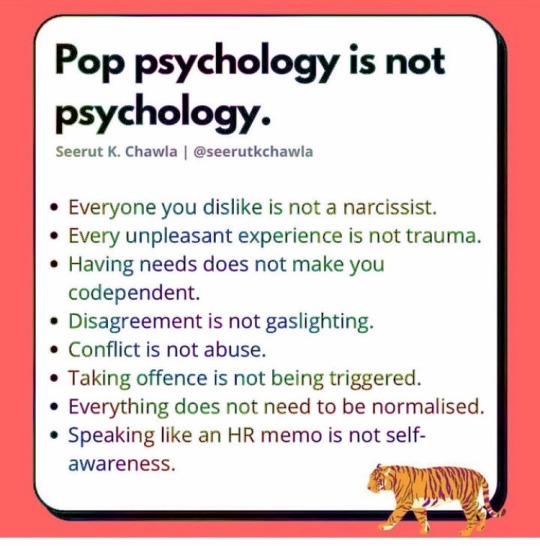
23 notes
·
View notes
Text
My therapist says the "all codependents are narcissists" (insane statement from an ex-mutual) is bullshit and also that diagnoses are made up for the sake of streamlining treatment/certain disability benefits/accomodations.
And also that pop psychology people are the most annoying people on Earth. Like when someone goes "hes such a psychoooo lol" about someone they've talked to once I think they personally should never be around other people for everyones sake. Or shouting "traumadumping"/"emotional labour" when someone is telling you how their day went. It's irritating as hell and no, saying "narcissist" about your makeup obsessed friend doesn't make you sound smart, it makes you sound like a weird and rude person.
Anyway my therapist has been in her profession longer than your famous youtube psychologist who is probably not a psychologist. Never believe anything anyone says about psychology, especially if they're armchair diagnosing someone they don't know, especially if their source is not a primary source who isn't making money on views, especially if they are making polarizing and generalizing statements about stigmatized conditions.
To reiterate: if it smells like bullshit, it probably is bullshit. If it doesn't, it's probably still bullshit and you're noseblind to it. Your hot takes are hot garbage and you need to stop pathologizing everything and agreeing with the first/most persuasive person to say something before your brain turns to mush. Also, always run reactionary-sounding ideas through at least 2 people not personally involved. Everyone needs a few impartial sets of eyes that are trustworthy and preferably have real experience in the topic at hand.
#my therapist said#my therapist#therapy#we are like that painting of the greek philosophers#pop psychology#makes me want to pop its followers into a fine reddish mist#^pop psychology users at the above statement already preparing 5 new diagnoses for me#therapy speak#ok thats all i had to say#moving on for real now from that trainwreck ex-moot after getting an extra set of eyes and brains#no more space wasted on this
14 notes
·
View notes
Text

Alright. That's it. We're done. Give me the words I am putting them in a locked safe in the cabinet above the fridge until further notice.
#this might be. the worst use of these words I've ever seen.#tiktok#pop psychology#fuck this man 😮💨#what do I tag this I want everyone to see it#gaslighting AND delusion. wow. imagine being this wrong about something.#imagine using words this badly.
12 notes
·
View notes